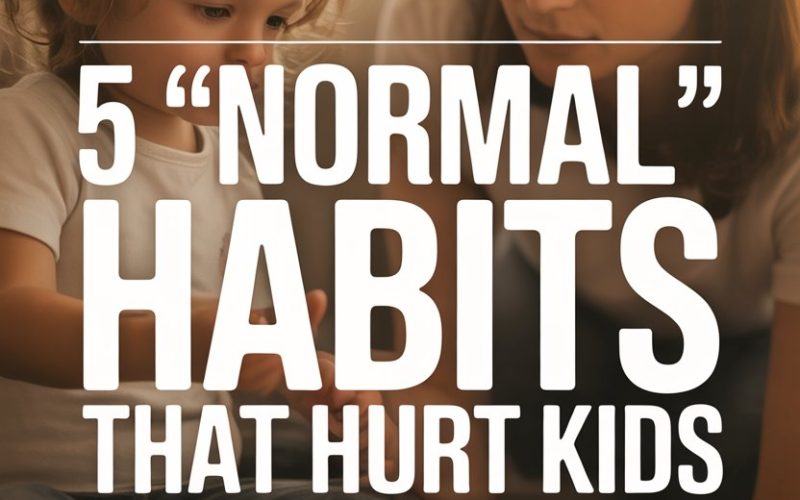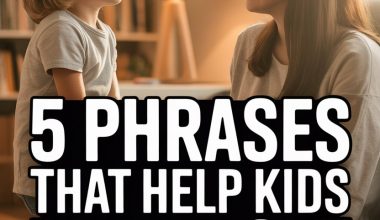Parenting is a little like assembling flat-pack furniture without instructions while a small person is throwing Cheerios at your head.
And sometimes, habits we pick up along the way—often borrowed from our own childhoods—can sting our kids in ways we never intended.
Here are five incredibly common habits that seem harmless but can cut much deeper than we realize.
1. Brushing Off Their Big Feelings
Ever heard yourself say, “You’re fine,” or “It’s not a big deal,” when your child’s face is crumpling over a dropped ice cream or a fight with a mate?
The intention’s pure: soothe them, downplay the disaster, and—let’s be honest—maybe save your own sanity.
But those little emotional brush-offs add up. Kids are still learning what their feelings even are, and when adults dismiss them, it can teach children to ignore or mistrust their own emotions.
According to Harvard’s Center on the Developing Child, emotional validation in early years is foundational for lifelong resilience and mental health.
Try this at home: Next time your child wells up over a seemingly trivial tragedy, try getting on their level (literally, eye-to-eye), and say, “I can see you’re really sad about that.”
You don’t have to agree it’s ‘the end of the world’, but just acknowledging their feelings works wonders. Kids who feel heard are more likely to open up the next time—and less likely to go nuclear over spilled Ribena.
2. Comparing Siblings or Friends
“Why can’t you be more like your brother and just eat your peas?” Ah, the classic. Or maybe it’s, “Ella finished her spelling—what’s taking you so long?”
It trips off the tongue, especially when you’re desperate for a peaceful dinner. But those comparisons can leave marks that last well into adulthood.
Research from the University of Dayton confirms that children on the receiving end of frequent comparisons tend to develop lower self-esteem and more sibling rivalry.
Turns out, nobody likes being measured against someone else—least of all kids, who are still figuring out who they are.
Here’s what works: Praise the effort, not the outcome. Swap, “Be more like your sister,” for, “I love the way you’re trying so hard with those peas!”
It’s ok to celebrate each child’s unique strengths, even if one’s great at spelling and the other’s a world-class mess-maker.
3. Always Rescuing Them from Struggles
It’s the parent’s urge: swoop in, fix everything, tie those shoelaces, finish that science project at midnight because “it’s just easier this way”.
But if kids never taste frustration, they don’t get to build the grit to handle it.
A study in the Journal of Experimental Child Psychology found that children whose parents consistently intervene rarely develop crucial problem-solving skills and persistence.
Helicoptering (yes, it’s now a verb) actually backfires—kids feel less capable, more anxious, and sometimes, a bit entitled.
Tonight, try sitting on your hands. When your child is wrestling with a tricky shoelace or a puzzle, resist the urge to jump in straight away.
Instead, offer encouragement: “That looks tricky, but I know you can figure it out!” If they ask for help, give just enough—maybe one step, not the whole answer.
The pride on their face when they finally manage? Worth every ounce of self-restraint.
4. Overscheduling Every Minute
Modern family life can feel like a competitive sport: ballet on Mondays, footie on Tuesdays, violin on Wednesdays, and a maths tutor lurking somewhere in the wings.
We sign our kids up for everything, convinced it’ll give them a leg up. But constantly being “on” can leave children stressed, exhausted, and disconnected from their own interests.
A report from the American Academy of Pediatrics highlights that unstructured play is not just ‘nice’—it’s essential for healthy brain development.
Downtime gives children space to explore, invent, and even get a little bored. (Yes, boredom is actually good for them. Who knew?)
If your after-school calendar is starting to look like the Queen’s itinerary, try carving out at least one afternoon a week for nothing.
Let your child choose what to do, even if that means constructing a pillow fort or painstakingly organising their Pokémon cards. Sometimes, magic happens in the gaps.
5. Modelling Perfection Instead of Authenticity
Ever tried to hold it together when you’re falling apart inside—put on the ‘perfect parent’ mask because that’s what grownups do?
Kids are sharper than a box of new pencils, and they pick up on everything—including the idea that mistakes are shameful and perfection is possible.
A study published on Newport Academy found that children who see adults never show vulnerability or admit fault are more likely to hide their own struggles, feel pressure to be flawless, and suffer from anxiety.
Swap perfection for realness. The next time you burn the toast or forget a school notice (again), own it: “Oops, Mum dropped the ball. Next time, I’ll set a reminder.”
Modelling how to apologize and bounce back shows your kids that mistakes are part of being human. And when your children see you being kind to yourself, they learn to be kinder to themselves too.
Turning Small Changes into Big Wins
Nobody gets through parenting without a few bumps, bruises, and laughable mistakes. The good news?
Kids are remarkably resilient, especially when parents are willing to tweak routines and admit, “Maybe I could try it a different way.”
Tonight, pick just one habit to gently shift. Maybe you’ll pause before rescuing or offer a listening ear when the tears flow.
Each time you do, you’re not just patching up your child’s day—you’re giving them tools to handle life’s wobbles with a bit more grace and a lot more confidence.
And if you mess up tomorrow? Welcome to the club. There’s a seat saved for you, right next to the half-eaten sandwich and the pile of mismatched socks.
Your kids don’t need perfect. They just need you—flaws, feelings, and all.




